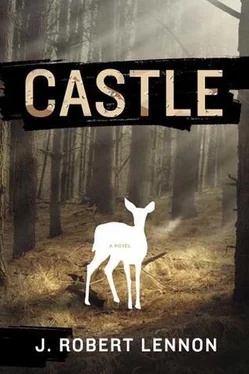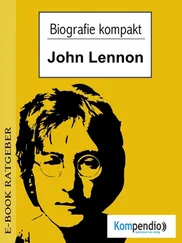Geary didn’t respond, except to continue shaking his head. From outside, we heard Lukens’s enraged voice, reverberating down the long hallway: “Hajji, quit the fucking whistling!”
Involuntarily, I let out a long sigh. Now I would need to discipline Lukens for losing his temper. But he had only given voice to emotions we were all feeling. The whistling — everything, in fact, the weather, the overcrowding, all of it — had come to seem like an accusation, one to which there was no reasonable response.
I sat down behind my desk and stared at the wall over Moss’s shoulder. A calendar hung there, one I had brought from the States. Each month bore a different kind of weather — hurricane, tornado, snowstorm. There was a thunderstorm in San Francisco — that was the photo for April — and a foggy Boston street scene for October. December showed now, and the picture was of a row of icicles hanging from the eaves of a barn in Maine. I had seen none of these phenomena in Iraq. There was no sandstorm on the calendar, and no drought. Soon I would need a new calendar, and the varieties of American weather would be thrown away. I began to wonder when I would next see an icicle, or a thunderstorm. I fell into a reverie of sorts then, remembering. I don’t know how long it was before Moss roused me with the clearing of her throat. I looked up.
“Sir?” she said.
“Bring the detainee to the infirmary, please,” I said. “You guard him, Private, until the medic says it’s time to put him back into the population. Geary,” I added, “go get some sleep. Let everyone get some sleep. And send in Lukens when you leave.”
“Yes, sir,” Moss replied. Geary nodded. And they walked out.
That was the beginning of what would prove to be a time of many problems at Camp Alastor. The problems I refer to are now well known, from the photographs taken elsewhere. I will not claim that we were entirely innocent of adopting such tactics with our detainees — we knew how to “push their buttons,” how to make them feel unclean, and humiliated. We understood how to frighten them — how to convince them that death was imminent without causing them lasting physical harm. We used dogs, and even snakes. We desecrated their holy books, blasphemed their God.
But we had been assured that the work we were doing was necessary and good, and that it would save lives. And there was a sense that, if only our expansion could be completed, if only more personnel were to arrive, then everything would settle down, and our work could be streamlined, and we could learn what we needed to without so much strenuous effort. Every day I expected the supply trucks to arrive, the troop transport vehicles. Every day I thought might be the day that we turned the corner.
Instead, three months later, I walked away from the man in the pit, entered the building, stumbled into the latrine, and vomited into the closest toilet. Then I walked to my office, closed and locked the door, and sat down behind the desk.
I didn’t move for some time. My body was slick with sweat and filth that even repeated showering had failed to remove, and the inside of my mouth was rank and gluey with sick. The calendar I had stared at during my discussion with Moss and Geary was gone now, and none had arrived to replace it.
Things had deteriorated quickly after the incident with Private Lukens. In retrospect, I see that I ought to have dealt with his actions more severely; or, ideally, I should have predicted the level of despair to which the situation would soon descend. Foremost among my failures had been my obliviousness to the anxiety faced by the men and women under my command. They, I now understood, were no better suited to the task of managing a vast and diverse prison population than I was; indeed, they were far less so. They had been trained in desert combat and, to a lesser extent, urban warfare. They knew how to identify an enemy and neutralize it. Now they had been charged with the welfare of hundreds of the very people they had learned to hate and fear — and been ordered, by me, to extract information from them.
Our mission was a failure. We had discovered close to nothing about the enemy, except how to hurt him.
And we did hurt him. The man Lukens had struck with his rifle endured further questioning, under even greater duress, and he gave us some names, which we passed on to the CW5 for intelligence in our theater. What value these names might actually have had, or if they were the names of real people, or people the man had invented to satisfy us, we never learned. But the names did represent a success of sorts, and the soldiers who extracted them were singled out for praise. And so our questioning intensified. That man, in fact, was the man in the pit, the man I threw my canteen to. We had likely gotten from him all that we could. Yet we couldn’t stop interrogating him. It was as though we had become addicted to him, fixated on the moment of relief we felt when he talked. We wanted to feel that relief again. We wanted to please our superiors and bask in their implicit approval.
We forced people’s heads into tubs of water and covered their faces with soaking rags. We burned them and bruised them and shocked them and bled them. We stripped them naked and paraded them in front of their countrymen. We threatened to murder their children.
It wasn’t that we felt nothing for these people, whose guilt or innocence was unknown to us, and unknowable. Indeed, we felt disgust. If they were guilty, then they were disgusting for their crimes; if innocent, they were disgusting for being foolish enough to be apprehended. When they cowered in terror from our blows, we hated their cowardice; when they tried to fight back, we hated their arrogance. When they begged us to stop, we hated their weakness, and when they silently endured, we hated their imperturbability. They were less than human, these people, these idiots whose language could not be understood, whose ways of living were so foreign. The more we hurt them, the more we hated them — how could they be so weak? How could they sit there and take it? Why didn’t they rise up against us? Why didn’t their people come with guns and bombs and free them? There were hundreds of them and dozens of us, and still they let themselves be dominated. And they said they knew nothing and no one, and yet, in spite of everything, they named names, they named places, they named times. And we gave the information to our superiors and the information was swallowed up, never to be heard again.
Two things happened in February. The first was that we had begun to hear rumors that there were photos, not from our camp, but from elsewhere, and that these photos had made their way into the civilian world. There was no immediate fallout from this revelation, but it cast a dark cloud over our operation, and made us all feel as if our work here was drawing to some kind of ignominious close.
The other thing was Sufian.
It was the boy, the one who was detained with the women. I had ordered him to be questioned when another detainee claimed that his father was a member of the insurgency loyal to Shiite cleric and Baghdad hero Moqtada al-Sadr.
I had told two soldiers to go and get the boy, and insisted that he be questioned in my office, not in the room where the other interrogations had been taking place. By this time I was well aware that the questioning had gone too far, but I no longer felt that I could stop it. I no longer felt that I had the authority to, and I had so come to despise the facility, my role as its commanding officer, and the detainees themselves, that I had no desire to. But I did not regard the women and the boy as part of the general population of the facility, did not regard them as dangerous or as valuable sources of information; and for the most part they had remained quiet and calm, had demanded little, and had acquiesced quickly and without complaint to all of our commands. And so the boy would be given special consideration during questioning.
Читать дальше











